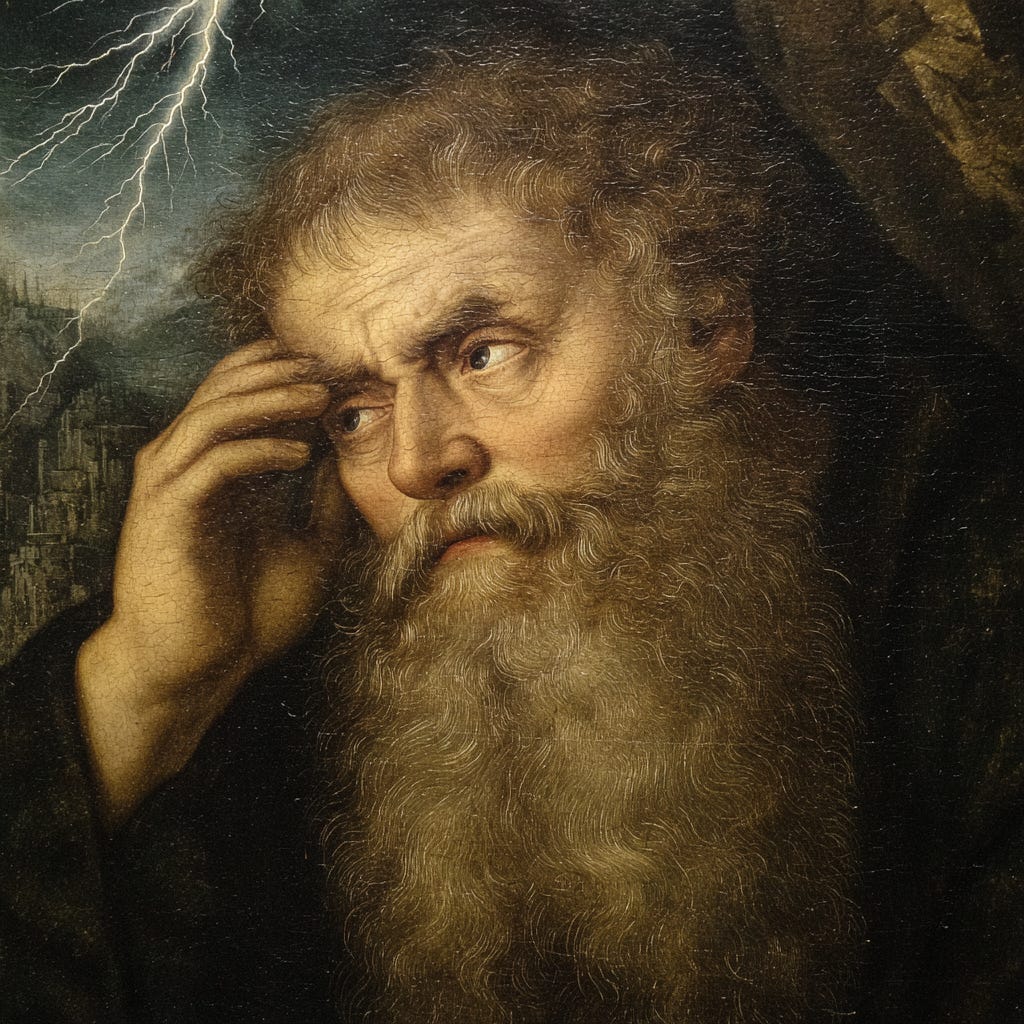Since antiquity, philosophers have pursued wisdom as the surest path to happiness, yet Ecclesiastes pierces this noble dream with his stark declaration: “For in much wisdom is much grief; and he that increases knowledge increases sorrow.” How can we reconcile the philosopher's luminous promise with this darker truth? The answer lies not in choosing between wisdom and sorrow, but in discovering how their union gives birth to a higher synthesis, one that transforms suffering into joy via catharsis.
The great schools of ancient thought erected their systems upon the conviction that knowledge liberates. The Stoics proclaimed that aligning our judgments with nature brings ataraxia, a state of being untroubled. Aristotle located eudaimonia in the actualization of our highest capacities. From Democritus to the Buddha, the diagnosis remains consistent: we suffer because we cannot see reality as it truly is. Euthymia ( good cheer) is the reward for being sober.
Across these traditions runs a common thread: wisdom appears as suffering's antidote, knowledge as turbulence’s cure.
Yet Kohelet surveyed this landscape and reached a conclusion that challenges philosophical optimism. Having tasted every pleasure and pursued every form of knowledge, he pronounced his devastating verdict: “All is vanity and vexation of spirit.” Far from diminishing sorrow, wisdom multiplies it.
Modern pessimists like Kafka captured this cruel irony: “There is infinite hope, just not for us.” The very clarity that philosophy promises becomes the source of our deepest anguish.
The notion that wisdom breeds sorrow rather than joy, or that meditation might lead to deeper depression rather than “liberation” seem to doom us to a terrible choice: remain in ignorance's comfortable twilight or embrace knowledge and its attendant grief. But there’s a third way, one that neither the optimistic philosopher nor the pessimistic sage fully grasp: the path of tragedy.
Unlike philosophy’s therapeutic ambitions, tragedy makes no promise of ataraxia or easy contentment. Instead, it confronts us with irreversible loss, heroic failure, and the brutal limits of human agency. The tragic hero’s downfall ought to increase our sorrow; yet through witnessing suffering that mirrors our own vulnerabilities, we experience what Aristotle termed catharsis.
This cathartic wisdom operates through a logic entirely foreign to philosophical therapy. Rather than teaching escape through rational detachment, tragedy compels us to feel more deeply, to surrender to vicarious suffering. It presents irreducible mysteries that can only be endured, truths known only through participation.
Nietzsche grasped this tragic wisdom with unprecedented clarity in The Birth of Tragedy. Apollo provides the dream-like illusion that gives individual existence meaning; Dionysus provides the ecstatic dissolution that reveals the eternal unity underlying all appearances. In their synthesis, the spectator glimpses achieves an aesthetic revelation that transforms, but does not erase, suffering.
This Nietzschean insight illuminates the poetry of Kohelet as well. Ecclesiastes achieves its unique power not despite its pessimism but through the aesthetic transformation of despair into beauty.
The biblical Psalms embody this same tragic sensibility. When the psalmist cries “How long, O LORD? Will You forget me forever?” he insists upon lament's legitimacy. Here we find not the philosopher’s rational equanimity but the religious poet’s determination to challenge God. The psalmist’s complaint becomes faith’s deepest expression, a trust so profound it dares bring sorrow before the divine throne.
Paradoxically, this unflinching confrontation with grief opens authentic joy’s possibility. The psalm beginning in anguish can end in genuine celebration: “But I have trusted in Your mercy; my heart shall rejoice in Your salvation.”
The sorrow that Ecclesiastes identifies as knowledge’s companion reveals itself not as wisdom’s failure but as its fulfillment. The happiness that popular philosophy promises—serene, untouched by pain—reveals itself as shallow beside this deeper joy that has wrestled with anguish.
Leo Strauss argued that philosophers must conceal their most radical insights from the public, presenting soothing doctrines while reserving dangerous truths for those capable of bearing them. The philosopher becomes a tragic figure, cursed with knowledge that isolates him from ordinary comfort. Yet even here we glimpse cathartic transformation: the courage to witness truth’s harshness becomes a form of heroic nobility, and the philosopher’s burden reveals itself as bitter gift.
The tragic hero’s fall, the psalmist’s lament, and the sage’s bitter, esoteric recognition all point toward the same discovery: authentic happiness lies not beyond sorrow but in its transfiguration.
P.S.—If you enjoyed this essay, then you’ll enjoy talking to Virgil, your intellectual companion to the Great Books. Join the Waitlist.






